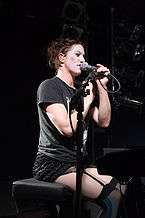Dark cabaret
| Dark cabaret | |
|---|---|
| Stylistic origins | |
| Cultural origins | |
| Typical instruments | |
| Other topics | |
Dark cabaret may be a simple description of the theme and mood of a cabaret performance, but more recently has come to define a particular musical genre which draws on the aesthetics of the decadent, risqué German Weimar-era cabarets, burlesque and vaudeville shows with the stylings of post-1970s goth and punk music.
Sources
Cabaret proper had long associations with counter-culture and dealt with disturbing themes, as exemplified by The Threepenny Opera by Bertolt Brecht and Kurt Weill, with one of its best known songs "Mack the Knife" ("Moritat von Mackie Messer") which tells the story of a murderous anti-hero, or the 1933 song "Gloomy Sunday" ("Szomorú Vasárnap") by Hungarian composer Rezső Seress with the more recent urban legends which have grown up around it. It was therefore natural that later artists drew upon it for inspiration: Nico's 1974 album The End... is an early example of such influence, especially in songs such as "You Forgot to Answer" and "Secret Side", while influenced artists associated with goth and punk music specifically include Nina Hagen,[1] Sex Gang Children and The Virgin Prunes.[2]
Dark cabaret as a style
One of the earliest bands to play mainly or exclusively in a style which might now be described as dark cabaret were the Tiger Lillies, formed in London in 1989. In the 1980s satirical cabaret had been revived and popularised by London-based bands such as Fascinating Aïda and Kit and The Widow but the Tiger Lillies incorporated themes of blasphemy, prostitution and bestiality in their songs, sung by Martyn Jacques in a menacing style with a falsetto voice.[3] A collaboration between Rozz Williams and Gitane Demone - both former members of Christian Death - entitled Dream Home Heartache after a song by Roxy Music, was recorded in the Netherlands and released in the United States in 1995 and was described by reviewers as "cabaret noir"[4] or "glam cabaret".[5] Following her 1996 debut solo album Quintessentially Unreal, San Francisco-based singer/pianist Jill Tracy released her second CD, Diabolical Streak, in 1999. Canada's Shift magazine called the album one of the "Top 10 Neo-Cabaret albums of all time."
Emergence of the genre

The term dark cabaret appears to have become popularized with the release of a 2005 compilation album entitled Projekt Presents: A Dark Cabaret by Projekt Records, a label chiefly associated with the goth genre.[6] The album included "Flowers" from Dream Home Heartache sung by Rozz Williams together with, among others, "Evil Night Together" by Jill Tracy, "Sometimes, Sunshine" by Revue Noir, and "Coin-Operated Boy" by The Dresden Dolls. Formed by Amanda Palmer and Brian Viglione in 2000, The Dresden Dolls described their music as "Brechtian punk cabaret", a term coined by Amanda Palmer in early 2003 in part to preclude being labelled by the media as goths.[7] Nevertheless, with their musical style and appearance in white face makeup and reduced period clothing, The Dresden Dolls and their fans quickly became the most readily identified with the newly evident dark cabaret genre,[8] garnering the most mainstream attention. Subsequently, bands began categorising themselves and their performance as dark cabaret, such as San Diego's The Tragic Tantrum in the US,[9] Katzenjammer Kabarett in France, or Ray Childish in Graz, Austria.[10]
New sects of dark cabaret have emerged from the previous theatrical dark cabaret. With a more aggressive side and a punk or metal background, with some bands also closely associated with the punk cabaret subgenre, for example: Stolen Babies, Birdeatsbaby and Harlequin Jones.
The appearance of an identifiable dark cabaret scene coincided with the rise of Neo-Burlesque starting in the 1990s. The two have become linked following the appearance of performers such as the Chicago burlesque orchestra Apartment (1997–2005) and the emergence of gothic bellydance. Collaboration with burlesque performers was given by Brian Viglione as the inspiration for The Dresden Dolls' look.[11]
Record labels
- Projekt Records
- No Comment Records
- The End Records
See also
References
- ↑ "The Seven Addictions and Five Professions of Anita Berber" Mel Gordon Voluptuous Panic: The Erotic World of Weimar Berlin (2006)
- ↑ Virgin Prunes: a short history at Mute Records
- ↑ Kenneth Goldsmith Criminal Castrati New York Press, 13 May 1998, quoted at http://www.tigerlillies.com, retrieved 4 June 09
- ↑ Gitane Demone interviewed by Matthew Moyer, 1998/1999, http://www.ink19.com
- ↑ Rozz Williams interviewed by Johnny Walker, Vibe, 1997, at http://thebluehour.free.fr
- ↑ Reviews of A Dark Cabaret quoted at "Projekt.com: Darkwave". Retrieved 13 November 2010.
- ↑ Speer, Deborah "The Dresden Dolls" Pollstar, 3 April 2006
- ↑ The Guardian Culture, review of Yes Virginia by Betty Clarke, 14 April 2006: http://www.guardian.co.uk/music/2006/apr/14/popandrock.shopping1
- ↑ http://www.tragictantrum.com/presskit/ retrieved 8 June 2009
- ↑ Ray Childish on MySpace Music http://www.myspace.com/raychildish retrieved 11 October 2010
- ↑ Michael Pope (Director) (2004) The Rise and Times of The Dresden Dolls [DVD] 8-ft Records